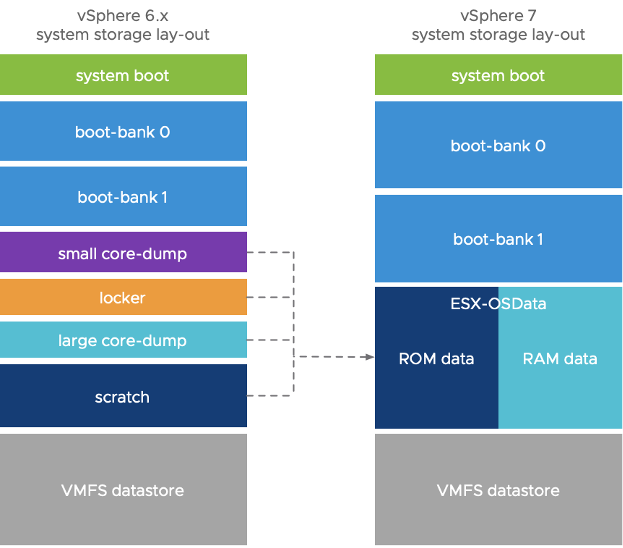 by Danny Simmons
by Danny Simmons
Senior Systems Engineer
VMware has announced that starting from the next major vSphere release, SD cards/USB media as a standalone boot device will not be supported. The decision to remove this option came about due to the many issues related to device reliability when SD cards are used as the boot device as reported by vSphere customers.
VMware strongly advises that you move away completely from using SD card/USB as a boot device option on any future server hardware.
vSphere 7 introduced changes to how the system storage partitions were laid out.
SD cards can continue to be used for the bootbank partition provided that a separate persistent local device to store the OSDATA partition (32GB minimum, 128GB recommended) is available in the host.
Preferably, the SD cards should be replaced with an M.2 or another local persistent device as the standalone boot option.

Additional information on ESXi System Storage Changes can be found here:
https://via.vmw.com/tchzcoreno2591

Additional information for solutions related to this article for ESXi 7.x and Future versions:
https://kb.vmware.com/s/article/85685

VMware strongly advises and highly recommends that customers start to plan and transition to use a persistent device for boot and ensure that SD cards are not chosen as an option to use as a boot device while ordering new hardware for their environment. Most vendors provide alternate boot devices including M.2 options.
Some of the reasons why SD cards will be unsustainable with the next major release are:
- Reads/Writes to System Storage continue to grow, mainly to the ESX-OSDATA partition. The OSDATA partition is a critical component that is required to be always available and also be persistent across reboots. OSDATA will be used in a variety of different ways as services and applications such as vSAN and NSX grow. OSDATA is used to store some of the runtime state, and for probes, backups of items such as configuration, timestamps etc. Access to other areas on OSDATA, such as VMTools and scratch portions will also grow. With each new vSphere release, more features will start relying on the OSDATA partition.
- Performance demands and IO loads cannot be continued to be met by SD cards. For example, the demands on writes to the scratch area have been growing. Another concern is the high frequency of IO with bursts such as logs or traces.
- There is no way to reliably check and monitor for the SD card endurance, as these devices usually do not provide support for diagnostics data. Wear-out issues and remaining endurance or lifetime can go undetected. In addition, not just writes but reads are also known to cause wear issues.
- SD/USB devices are prone to wear over time and are thus subject to failures, they are not designed for enterprise class use-cases.
Helient Systems will be contacting our Managed Services customers and Hardware Vendors to plan and account for these changes in future implementations.
If you would like assistance planning and remediating your environment, please contact our experts at service@helient.com.


